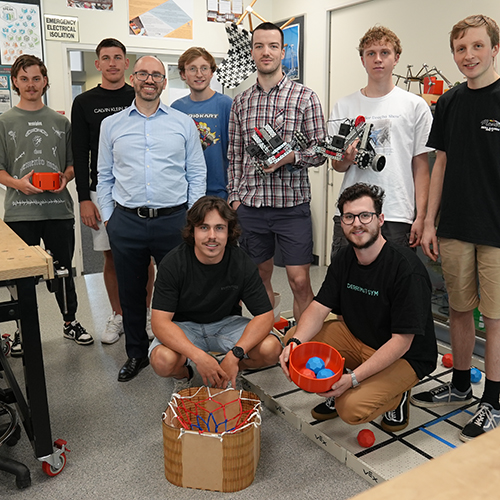25 October 2024
Cheers of excitement, high-fives all around, and wide, beaming smiles – they’re all the signs of a team success. But this is not a sporting field – this is the camaraderie found among the next generation of teachers learning the very latest, world-class robotics programs so they can excite and inspire students about STEM.
And on World Teachers' Day today, there’s no better time to highlight passionate, job-ready teachers who have the expertise needed to tackle STEM skills shortages across Australia.
Robotics and automation are in huge demand across multiple industries. Yet, despite the need, very few education initiatives are preparing students with these future skills.
As the only university in Australia and Southeast Asia to incorporate VEX Robotics as part of its digital electronics undergraduate course, UniSA’s pre-service teachers are ensuring the future workforce is not only skilled, but passionate about robotics and STEM.
UniSA Education Futures course developer and robotics expert, Emil Zankov, says it’s vital for universities and schools to embrace robotics as part of their students’ learning experience.
“Robotics is a fantastic way to introduce and get students excited about STEM and computer science. Yet many teachers struggle to embrace new technologies because they’re not familiar with them and didn’t learn about them at uni,” Zankov says.
“That’s where UniSA comes in. Through the VEX educational robotics program, our pre-service teachers graduate with the skills to teach robotics confidently and creatively in schools.

“It’s so important for universities to educate teachers with these sorts of technical skills; not only because we have a responsibility to deliver professional, job-ready graduates, but also because these teachers will be the ones to inspire students to consider STEM pathways as an exciting area to pursue.”
Globally there is a STEM talent shortage, with nearly half of businesses struggling to recruit people with the STEM skills they need. In Australia, school students’ interest and performance in STEM subjects is stagnating or declining, with the Australian government calling for a collective effort to initiate change.
Zankov says VEX is the program of choice because it can deliver robotics education across the school continuum, from Reception through to Year 12.
“This is a platform that we can use all the way from five-year-olds through to our high school and tertiary students. That's what makes it so exciting – we have this resource rich environment, and very robust program that allows lots of different aspects of robotics any pre-service teacher to engage in,” Zankov says.
“Through the VEX program teachers support their students to plan, design, code and construct a working robot, with the option of entering it into a competition at the end of the module.
“But it’s not just about technical or engineering skills; the program also embraces strategy, teamwork, resilience, automation, documentation and report writing, problem solving and more. So, there are a lot of transferable skills that come into play.
“Ultimately, being involved in this program inspires students to want to go into STEM through an authentic, hands-on approach they've had at school.
“When you hear students audibly excited about what they’re doing in class, there’s no better satisfaction. Seeing students learning because they want to learn; seeing them passionate, high fiving each other, and saying, ‘Yes, it's working!’ and their robot is doing what they wanted it to do after they've programmed it… that's what really puts such a buzz in a teacher. That’s pure magic.”
Notes to editors:
The DATTA SA VEX State Championships will be held at UniSA’s Mawson Lakes campus on Monday 28 October. Run by DATTA (Design and Technology Teachers Association of SA) in collaboration with the University of South Australia, this competition will see more than 300 school students showcase and compete their robots in a series of graded competitions. To find out more, visit: https://datta.sa.edu.au/datta-sa-vex-tournament/
Photos and video available upon request.
…………………………………………………………………………………………………………………………
Contact for interview: Emil Zankov E: Emil.Zankov@unisa.edu.au
Media contact: Annabel Mansfield M: +61 479 182 489 E: Annabel.Mansfield@unisa.edu.au




